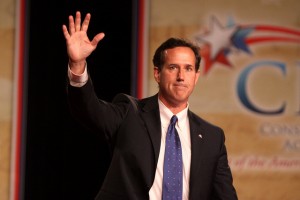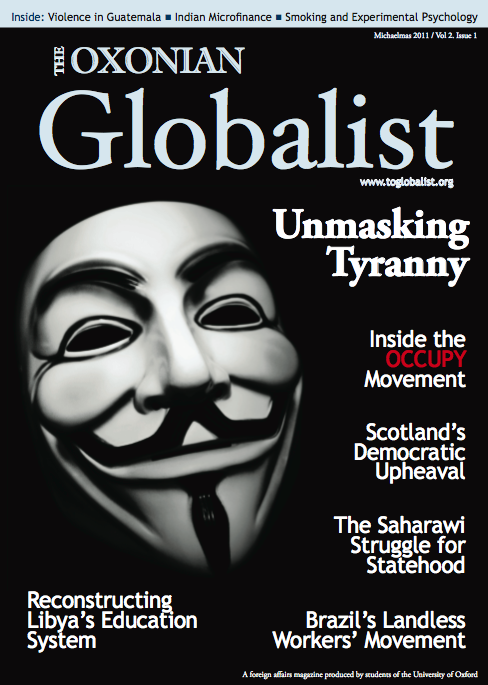
Rick Santorum, like Ed Miliband, won't appeal to mainstream voters. Photo by Gage Skidmore via Flickr.
A humiliating defeat for the Labour Party under Gordon Brown seemed inevitable in the run-up to the 2010 election. After a seemingly unending wave of negative press, culminating in Brown’s infamous encounter with an angry old-age pensioner in the weeks before the election (‘that bigoted woman’), it seemed Labour’s third consecutive term in power would result in a defeat that would leave them without a chance of regaining power for generations to come. As luck would have it, Labour’s defeat was not of the catastrophic proportions that had been envisaged only a year before. A once commanding 12-point lead had dropped to just 7 percentage points by the election in May 2010 and the Conservatives, confident for so long of an outright majority, were forced to concede to something Britain hadn’t experienced for some time: a hung parliament. Two years later, the Conservatives and the Lib Dems are locked in a coalition government that is much more harmful to the smaller of the two parties. The Labour Party, post-Blair however, has had a period of extended introversion. A lengthy leadership battle, dominated by the Miliband brothers (David and Ed), represented not only a familial battle but a battle between the Blairite and Brownite factions that had dominated New Labour for all too long. Against the odds, and the polls, Ed, the less politically adept but more union-friendly of the two, triumphed and Labour has made clear its stance for the future: rather than seeking an immediate return to power, the party has sought to re-evaluate a brand which seemed to have lost its way post-2007 and Tony Blair’s third election triumph. While this bout of political self-harm may have been seen by many at the grassroots level as merited, the ultimate reality is that not only has Ed Miliband been found lacking as a leader, but the attempt to return to a rose-tinted pre-Blairite/pre-Brownite party ignores one glaring reality: before this New Labour flourish, the party was never able to mount sustained governance as they were from 1997-2010. David Miliband’s sidelining is all the more glaring as he was the candidate with the most first-preference votes in the leadership election, ultimately defeated on transfers that helped pip his brother over the finish line. While David represented a national leader ready to challenge the Conservatives from the off, Ed is very much a Labour leader: his, and his party’s, inability to engage with the political centre and gain traction with the electorate at the Coalition’s most glaring weakness- the economy- is testament to a party that is not only losing ground, but striving for a purity that is no longer relevant in the modern era.
Mirroring this bout of political self-harm for a sense of core values is another party attempting to re-imagine itself following a bruising 5 years. Following the terminal decline which the latter years of George W. Bush’s presidency became, in the 2008 election the Republican Party opted for a candidate with a sense of independence they hoped would appeal to the moderate centre on the American political spectrum. While the election campaign would ultimately chip away at Senator John McCain’s ‘maverick’ credentials as he increasingly veered towards the right and made current Tea Party favourite Sarah Palin his Vice-Presidential nominee, the tactic from the offset was politically sound: in an election where the Bush name was toxic, the only possible chance for the Republicans to regain power was an independent line that emphasised distance with a highly tarnished, post-Iraq/Katrina brand. Yet, while Obama inherited a failing economy in 2008 and the Republicans soon set about disrupting his seemingly liberal agenda, the lessons of the ’08 election have been lost on Republican party strategists. The failure of the McCain camp was not due to a failure to adhere to some vague, conservative principles but rather an attempt to appeal to a conservative, Christian base that was not the group most up for grabs in the election race. Given the drubbing Bush was continually receiving in opinion polls, McCain’s 46% of the vote represented a small triumph for the Republicans. A more moderate choice of Vice-Presidential nominee, such as former Pennsylvania Governor Tom Ridge, might have alienated the conservative right, but would ultimately have made independent Republican thinking the cornerstone of the campaign. Instead, the McCain camp succumbed to the lowest common denominator. In the 2012 campaign, the Republican party is set on making the same mistakes again yet even sooner than before. It is for this reason that the recent ‘Santorum Surge’ against Mitt Romney is so pointed. As for Newt Gingrinch before him, Rick Santorum represents not only a conservative alternative to a flip-flopping Mitt Romney, but an attempt by the Republican right to contest the election on their terms, no matter what the potential results. Poll after poll shows Gingrinch and Santorum being handsomely beaten by President Obama while Romney, once a rather effective governor of liberal Massachusetts, is the candidate most capable of challenging Obama, although he is still trailing in the polls in most projections. In a bout of supreme irony, Romney’s wealth and business acumen has now been consistently used against him by his opponents as emblematic of his distance from ordinary workers and the cutthroat nature of private equity management.
The Republican Party leaders are engaging in the same process as the Labour Party in the UK, but in a much more vocal, protracted and chaotic way. While the Labour Party are seen as chameleon-like in their current financial plans for an austerity-driven Britain, the Republican party of Santorum and Gingrich represents a return to the ‘Culture War’ politics of the early noughties that brought Bush short-term conservative gain, but ultimately hampered any chance of long-term innovation in the White House, partisan or otherwise. Both parties are engaging in elements of political self-harm, drifting further and further from the political centre they desperately need if they want to regain power in the near future.



